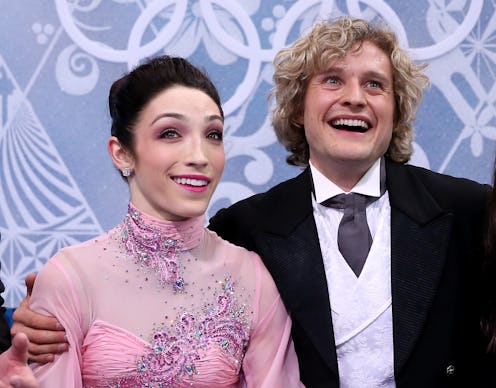News
4 Times Canada Cried Olympic Conspiracy
We tend to think of the Olympics as the height of competitive virtue, a delightfully meritocratic example of honest sportsmanship. But sometimes, things don't sit quite so nicely with the losers. Just ask Canada: a Toronto Star columnist penned a furious column Monday after the country's Olympic loss to America's Meryl Davis and Charlie White. Columnist Rosie DiManno insisted the judges fixed the scores so Canada lost the ice dancing event.
And this isn't the first time Canada has cried conspiracy theory. It's understandable: The colossal pain of falling just short of ultimate Olympic triumph can be difficult to come to terms with. And believe it or not, Canada's shriek of "conspiracy!" has sometimes turned out to be correct.
Rightly or wrongly, the country has felt some soreness over the years on controversial Olympic outcomes...
Ice Dancing: "A Tawdry Whore of a Sport"
Such was the assessment of Rosie DiManno, columnist for the Toronto Star. Following Canadian ice dance duo Virtue and Mior's defeat by Americans White and Davis, fired out a fuming piece condemning the outcome and claiming corruption.
"The villainy of ice dancing knows no bounds," began DiManno, before criticizing the event's legitimacy. "If the fix is not in against Tessa Virtue and Scott Moir, then I’m the Princess of Wales. ... That’s how they do it in this sleazy game. They too often take it out of the hands of the skaters. I am not a homer and the written record at these Games will show that. But a quarter-century of covering the sport has taught me that figure skating can never be trusted and ice dancing is the worst culprit."
A subsequent piece by DiManno suggested a corrupt deal between the Russian and American judges to secure the United States' pair the gold medal. It's an allegation also reported in France this week, which the IOC declined to investigate as "gossip."
Canadian Lugers Cursed By Slow Ice
Canadian authorities called for a rule-change in the aftermath of their fourth-place finish in the team relay last Thursday, claiming different ice conditions for their lugers than those of other nations. Team Canada's coach Wolfgang Straudinger insisted after the race that the Russian team, scheduled to start earlier than his own, had much faster ice.
By the time it was Canada's turn, in Straudinger's view, the slowed ice had essentially hung them out to dry.
The performance director of the Canadian Luge Association, Walter Corey, had Straudinger's back — without necessarily believing in the conspiracy. "We’ll support our coach 100%. Whether it’s a conspiracy, whether it’s malicious or not, it’s just a fact that the ice slowed down."
Team Canada Women's Soccer "Robbed" By Team USA
Even though we associate our Canadian brethren with the frost and chill of the Winter Games, their recent spate of controversial or contested events is not without a summertime counterpart. Look no further than the 2012 women's soccer team, which lost a heartbreaking and controversial semi-final match to Team USA.
Leading 3-2 in the second half, Canada's goalkeeper Erin MacLeod secured a ball around the goal, but was judged by officials to have taken longer than six seconds while searching for a place to throw it. This yielded a free kick which struck the arm of a Canadian player, resulting in a yet-more controversial handball call, setting up the penalty kick which tied, and for Team Canada ultimately lost, the game. The Canadians would place third, netting a handful of bronze medals, and judging from MacLeod's take, a lot of resentment:
"We feel like we got robbed in this game. The referee said I had the ball for ten seconds. She obviously counted the time I was on the ground with the ball. Once I got to my feet I calculate I only had the ball for five seconds."
Team captain Christine Sinclair was similarly forceful in her belief that a rightly victory had been wrenched away:
"We feel like we didn't lose. We feel like it was taken from us. It's a shame in a game like that, which is so important, that the ref had such an impact on it. We feel cheated."
The Canadian Figure Skating Controversy
The 2002 Winter Olympics stand as the biggest testament to Canada's history with getting screwed — or, at least, appearing to — on the world's biggest stage.
The Games were in Salt Lake City, Utah that year, and the Canadian figure skating duo Jamie Sale and David Pelletier were competing for a gold medal against Russian athletes Elena Berezhnaya and Anton Sikharulidze. Following an error coming out of a triple-axel in the Russians' free skate portion of the program, and a near-perfect performance by the Canadians, the stage seemed set for Sale and Pelletier to ascend.
But when the judge's scores came in, the shock wasn't just to those in the crowd watching — broadcasters were shocked as well. Both the American and Canadian televised broadcasts jumped the gun in calling Sale and Pelletier as the winners at the end of their set, and reacted incredulously at the dubious-seeming decision.
Rumors of a judging scandal were set off almost immediately, and it seemed to be credible: Amid continued suspicion and questioning, French judge Marie-Reine Le Gougne allegedly claimed in the midst of a breakdown that she'd been pressured by the head of the French skating organization to support the Russian team, though Le Gougne would later denied this in a signed statement.
For Sale and Pelletier, however, this is the rare charge of conspiracy with a sweet outcome, as their silver medals were upgraded to golds, and the Russians, deserving of their own, got to keep them too.
